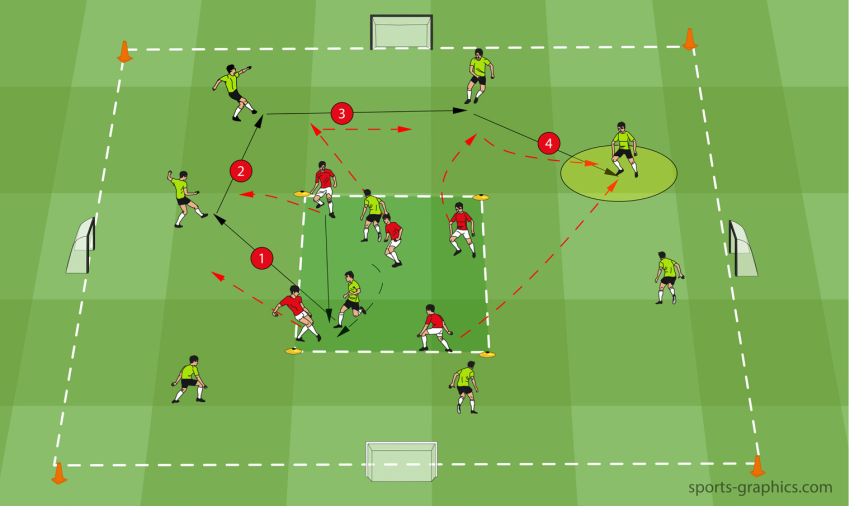Soccer drills for coaches are essential tools in the development of successful teams on the field. By implementing effective soccer training drills, coaches can enhance their players’ individual skills while also fostering a spirit of teamwork and communication. These dynamic practice plans for coaches not only focus on essential skills like ball control and passing but also encourage collective team performance improvement. Whether you are coaching youth soccer drills or working with experienced players, targeted drills can elevate your team’s capabilities and confidence. In this guide, we will explore various engaging drills that are crucial for unleashing the full potential of your soccer squad.
In the world of soccer coaching, it’s vital to recognize the significance of structured training sessions. As coaches seek to refine their players’ techniques, employing routines such as skill enhancement exercises and collaborative drills proves paramount. The art of developing effective training circuits that promote individual practice and team cohesion can substantially improve the dynamics of the game. With a focus on fun and fundamentals, using varied approaches to skill training, such as juggling and tactical awareness, empowers athletes of all ages. Join us as we delve deeper into top strategies that will enrich your soccer coaching toolkit.
The Importance of Soccer Drills for Coaches in Youth Development
Soccer drills are essential for coaches working with youth teams, as they form the foundation of a player’s development. By incorporating age-appropriate drills, such as basic dribbling and passing activities, coaches can enhance individual skills while fostering a love for the game. Drilling player fundamentals through repetitive practice transforms technical skills into muscle memory, leading to improved confidence on the field. This foundational impact not only helps in creating better players but also influences a team’s overall performance positively.
Effective soccer training drills lead to significant improvements in team dynamics and communication. Engaging youth players in structured practice sessions encourages them to develop teamwork skills that are crucial during matches. For instance, drills that involve passing and team coordination can help players understand their roles within the team better. A well-structured practice plan that emphasizes these drills allows players to experience practical applications of what they learn, ensuring that their skill improvement translates to on-field success.
Optimizing Soccer Training Drills for Higher Performance
To achieve optimal performance on the field, coaches must meticulously design their soccer training drills. This entails selecting activities that not only enhance individual skills, like juggling or dribbling, but also promote teamwork and tactical understanding. For example, incorporating small-sided games within practice plans allows players to utilize their skills in realistic scenarios, encouraging them to think strategically while refining their practiced techniques. This adaptability is vital for players, especially in high-pressure match situations.
Moreover, tailoring soccer drills to fit the skill levels of players can significantly impact their growth. Coaches should assess their team’s abilities and adjust drills accordingly, ensuring that each player is both challenged and supported. This customization enables players to grasp new concepts at a comfortable pace while also pushing their limits. By consistently integrating innovative drills and keeping training sessions engaging, coaches create an environment where players are eager to improve, ultimately leading to better team performance during competitive play.
Frequently Asked Questions
What are some effective soccer drills for coaches to improve team performance?
To enhance team performance, coaches should focus on various soccer drills that target skill development and teamwork. Dribbling drills help players improve ball control under pressure, while passing drills strengthen accuracy and communication within the team. Juggling drills not only warm up players but also enhance their coordination and ball handling, making them essential in any soccer training plan.
How can beginner coaches implement soccer training drills for youth teams?
Beginner coaches can effectively implement soccer training drills for youth teams by creating structured practice plans that include warm-ups, skill-focused drills, and game scenarios. Start with engaging activities like juggling drills to warm up, followed by core exercises on dribbling and passing to improve individual competencies. Incorporating small-sided games will also help players apply their skills in a match-like environment, promoting teamwork and interaction.
| Key Point | Description |
|---|---|
| Importance of Soccer Drills | Soccer drills enhance individual skills, build confidence, and improve team dynamics, essential for team success. |
| Types of Drills | Includes dribbling, passing, and juggling drills that focus on specific techniques and game scenarios. |
| Structured Practice Plans | A clear practice plan should include warm-ups, core drills, game scenarios, and cool-down activities. |
| Youth Soccer Coaching | Balancing competitiveness with enjoyment helps cultivate a positive environment fostering skill development. |
Summary
Soccer drills for coaches are essential for enhancing team performance on the field. By incorporating various drills such as dribbling, passing, and juggling, coaches can significantly improve both individual and team skills. Crafting structured practice plans that engage players and focus on essential techniques is crucial, particularly for youth soccer. Moreover, fostering teamwork and a positive mindset within the group not only aids in skill development but also makes learning enjoyable for young athletes. As coaches refine their methodologies and stay informed about best practices, they ensure that their teams are not just well-drilled but also instilled with a love for the game.
